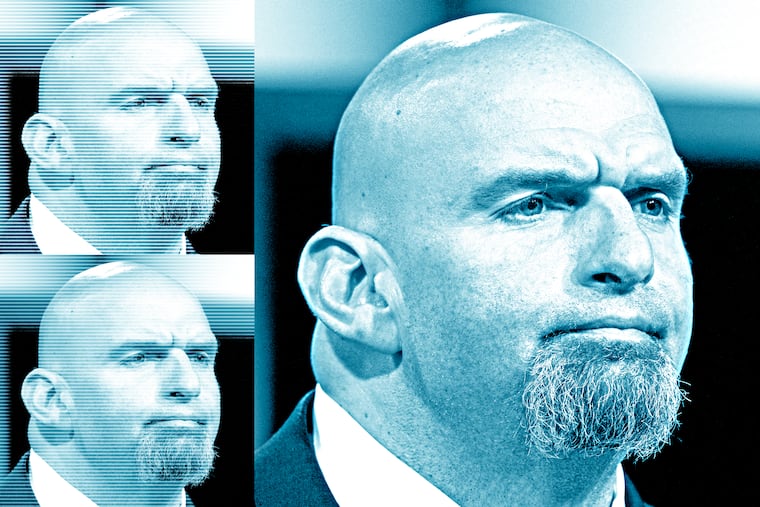Fetterman deserves more than just closed captioning
Accommodations are intended to level the playing field, and Fetterman’s didn’t come close.

Like many people, we cringed as we watched the debate between Mehmet Oz and John Fetterman — not because of Fetterman’s performance, but because of how poorly his needs were accommodated.
Given Fetterman’s recently acquired auditory processing difficulties, the idea that closed captioning alone would enable him to process, formulate, and coherently express his thoughts in 15- to 60-second windows was — to put it lightly — magical thinking.
As a person with a disability who works in disability policy and as a speech/language pathologist for individuals with communication challenges, we know from our own experiences that this is simply not how accommodations work. Accommodations are intended to level the playing field so that the candidates can compete equally, and Fetterman’s didn’t come close.
Accommodations, by design, are highly individualized. While neither of us is in a position to know the exact accommodations Fetterman required, we observed significant problems with what was provided.
In this case, Fetterman, like some others recovering from a stroke, appears to require extra time to integrate what he has heard and seen before he can respond. These accommodations have nothing to do with intelligence or ability to serve.
» READ MORE: Voter's guide: Everything you need to know about the 2022 election
Closed captioning, the sole accommodation provided to Fetterman, can be helpful for someone who processes visual information better than auditory information. But during a debate, where multiple people were speaking rapid-fire, it would be difficult for Fetterman to integrate what he needed to read in order to process what was being said.
Thus, closed captioning did not account for the competing spoken and written messages that occur during a debate. I (Fishbein) have ADHD, Tourette syndrome, and a processing speed delay. I accommodate for a similar issue by using a notetaker in meetings because I cannot process what I’m hearing and write it down at the same time.
» READ MORE: Why Pennsylvania is not ready for a disabled leader
People who have experienced a stroke often demonstrate delayed response times and can find it difficult to process large quantities of written information.
Set up as high-stakes political theater, debates require candidates to respond within an allotted time, often to large quantities of information. Fetterman was expected to integrate what he had read and respond immediately with precision and concision.
This type of pressure can be particularly difficult for individuals experiencing processing issues, resulting in increased difficulty formulating thoughts. During the debate, we watched with frustration as Fetterman formulated his response just as the buzzer went off, only to be cut off mid-sentence by one of the moderators as he attempted to locate the correct words.
An appropriate accommodation would have been to plan for Fetterman’s language processing needs by allotting him extra time to digest what he’d read and formulate his responses. We understand the conundrum for the moderators, who were trying to maintain the debate rules. If it were to be truly accessible, the debate moderators should have started the clock when Fetterman started talking.
Even the layout of the stage was problematic, given Fetterman’s needs. Oz was able to turn his head, talk to, and directly observe the reactions of his opponent and the moderators. Conversely, Fetterman needed to keep his eyes on the monitor. This made him appear awkward and stiff. It affected his ability to fully connect with the moderators and his opponent, and to derive information from their body language and facial expressions.
The lecterns should have been positioned so that the candidates were facing each other with the screens for captioning on the lecterns or over each opponent’s head.
“If elected, Fetterman will need to surround himself with people who know his challenges and can effectively support him.”
Communication needs vary with context for any individual. If elected, Fetterman will need to surround himself with people who know his challenges and can effectively support him in overcoming the barriers they present. This is a reasonable accommodation and one that should be made available if Fetterman is elected to the Senate on Nov. 8.
To advocate for the citizens of Pennsylvania, Fetterman will need to learn to advocate for the accommodations he needs to do his job. This starts with reaching out to experts who fully understand his needs, particularly as his condition improves and those needs shift.
Had Fetterman received the proper accommodations for this debate, we believe Pennsylvanians would have been provided a clearer view of how the candidates compare with each other.
Adam Fishbein is a disability policy expert and lifelong advocate for people with disabilities. Raised in Elkins Park, he was diagnosed with Tourette syndrome and ADHD at the age of 7.
Susan Paul is a certified speech/language pathologist and the founder of Communiverse LLC, a private group therapy practice located in Conshohocken, serving the neurodiverse population across the life span.